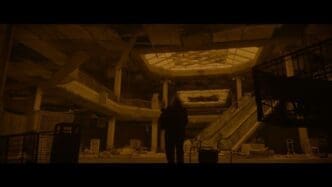The future can be terrifying, especially when it’s one where Ivanka Trump has ruled a dystopian America for 30 years. This is the unsettling premise of Asif Kapadia’s new documentary, ‘2073’. It’s a chilling tale, painting a picture of a fascist state. Kapadia is no stranger to pushing boundaries, and his latest work is no exception.
Kapadia blends real-world interviews and news footage with a fictional narrative, creating a world that’s disturbingly plausible. Inspired by the 1962 film ‘La Jetée’, ‘2073’ explores themes of AI, climate change, and authoritarianism. The story is set in a future where democracy is just a memory. The film premiered at the Venice Film Festival and releases on December 27.
A Dark Vision of Tomorrow
Imagine a world where the nightmares of today have become the reality of tomorrow. Asif Kapadia paints this grim picture through ‘2073’. The documentary blends fact and fiction to explore a future that might be closer than we think. The film features Samantha Morton as a survivor navigating through a police state controlled America. It’s a stark reminder that complacency can lead to dire consequences.
The Blending of Genres
The docudrama uses horror as a tool to engage, with Kapadia stating his aim was to deliver a film akin to the horror genre that audiences flock to cinemas to watch. It’s an experiment in storytelling that challenges the way we perceive documentaries.
The Influence of the Past
‘2073’ considers what might have happened if past errors had been addressed. It’s a fictional route, taking creative liberties, but these scenarios hit close to home. Real-world figures and powerful entities are depicted throughout, casting a stark light on present global leadership.
A Story Rooted in Alarm
By showcasing a world where democracy is a relic of the past, ‘2073’ encourages a conversation about the role of individuals in society. It’s a provocative call to action against passivity in the face of progressive deterioration.
Creating a Cinematic Experience
The film’s backers, including Neon and Film4, were crucial in bringing this vision to theaters. Their belief in Kapadia’s approach underscores the importance of presenting this story as a major cinematic event.
Shock as a Catalyst for Change
Viewers are called to educate themselves through the journalists featured in the documentary, recognizing journalism’s critical importance in today’s world. The film speaks to the necessity of informed public engagement.
Documentary as a Medium
His dissatisfaction with the slow nature of fiction is evident as he leverages nonfiction elements to create an impactful message. This blend ensures that audiences remain engaged and responsive to the issues presented.
The Political Landscape
This choice reinforces a narrative about the dangers of ignoring political realities and serves as a mirror to today’s world. Viewers are left pondering the fine line between fiction and reality.
A Testament to Journalism
By spotlighting journalists, the documentary emphasizes the importance of informed citizens. It calls for a revisiting of their work to inspire action and awareness.
The Essence of ‘2073’
Ultimately, ‘2073’ is a profound look at a potential future, both a warning and a motivator for change.
Asif Kapadia’s ‘2073’ is more than a film; it’s an urgent message. By combining fiction with fact, it’s a stark reminder to act before it’s too late. Kapadia’s work serves as a wake-up call, urging us to confront our present to secure a better future.
Source: Variety







